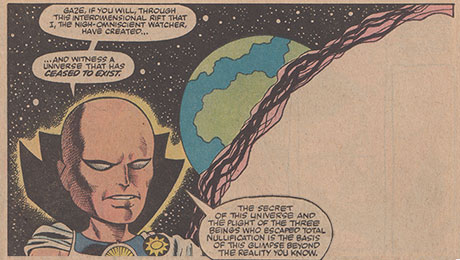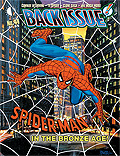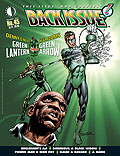 Doug: Today I'd like to open it up to discussion of what you think was the most important event of the Bronze Age. As we are always subjective around here, feel free to state the event you feel truly resonated during this time period, and why you feel it was so significant.
Doug: Today I'd like to open it up to discussion of what you think was the most important event of the Bronze Age. As we are always subjective around here, feel free to state the event you feel truly resonated during this time period, and why you feel it was so significant.Some nominees might be:
- Jack Kirby leaving Marvel Comics for DC
- Jack Kirby leaving DC for Marvel Comics
- the Death of Gwen Stacy and the Green Goblin
- Stan Lee resigning as Editor-in-Chief of Marvel Comics
- the advent of the All-New, All-Different X-Men
- the escalation of "dark" characters and storylines



















































19 comments:
If I can pick two I'd say Jack leaving Marvel was the bombshell of the era. If I can pick two, I'd have to add Stan stepping down, because with that move the Silver Age was officially done once and for all.
Rip Off
I'm going with poor, poor Gwen. The storytelling style across the board changed when heroes' significant others became fair game for the angst mill. I don't think Jean would've died had it not been for Gwen.
I think I'm gonna have to agree with ChrisPV here, and go with the death of Gwen Stacy. I think it's a stand-out moment in comics, full stop, let alone in the Bronze Age alone.
I gotta go with the All New! All Different! X-men. That series and those characters are still having a huge impact(positive and negative) on comics,fandom,collecting,tv,film.
Gwen would be a close 2nd place for me.
As much as I love Kirby,I think his best work was behind him by the time he left Marvel. I like the New Gods and love some of the characters(especially Barda & Darkseid)but I've always felt Kirby's clunky dialogue undermines the story. It hasn't aged well. I don't care much for the stuff he did when he returned to Marvel either,although 'Devil Dinosaur' is a sentimental favorite because it's actually the first Kirby work I ever read! It's too bad Lee and Kirby couldn't work together anymore,because they needed each other to create all the wonderful stories & characters of the Silver Age.
I'll go with the death of Gwen too. As ChrisPV said, it was a game changer.
I'll go with the death of Gwen Stacy too. Kirby's switch to DC & Lee's stepping down as writer were significant but don't seem to have had a serious impact on the tone of the regular superhero mags. However, Gwen's death was the big signal that things were changing and wouldn't always be as cheerful or optimistic as in the old era. I don't think any other previous story created such an emotional jolt in comics readership. And I suspect no other story since then has had quite the same impact, not even the death of Phoenix in X-Men years later. Heck, even when Superman was killed off, readers were canny enough to know he wouldn't stay dead and the story was more of a publicity stunt than anything else. But, say if Lois Lane was murdered and Clark wound up marrying Lana Lang ....
Y'know, I wonder if DC would ever have had the guts to kill off Lois Lane. Now they wouldn't (heck, the people they DID kill can't stay dead), but say back 30 or 40 years ago, would there have been a chance as a sort of oneupmanship to Marvel?
Obviously it never happened, but I can't help wondering if the thought had ever occurred to a writer if it would have been weighed as a possibility or simply shot down outright? And for that matter, would she have stayed dead?
I imagine a parallel universe where Spider-Man married Gwen Stacy after a 50 year courtship, and Lois was killed in favor of Lana. And every five years, the readers live in fear of some editor bringing her back...
Let me throw this out -- did the relaxation of the Code make possible all that happened in the Bronze Age? Is that the watershed event?
Also, all of the new creators that engineered the Bronze Age was more of an evolution than a defined moment, but important nonetheless.
I like your posit about Lois Lane, ChrisPV. With Lana waiting on the sidelines, somewhat akin to Mary Jane, it certainly could have been possible. I just don't think DC was willing to take such a chance. As popular as Spider-Man is (was), he'd been around only a fraction of the time that Superman had been around and didn't have nearly the backstory. And you don't tug on Superman's cape...
Maybe DC should have put it out to the fans in a 1-900 number poll.
Doug
I'm going with Jack leaving Marvel for DC. In addition to the obvious creative impact, it also increased the flow of creators back and forth between the Big Two, opened up the door for creators to live outside of New York (Jack relocated to California), and gave the emerging fan press its first HUGE story to chew on. That final item is important because that fan press would help bring attention to the fight for creator rights, which, along with the emerging direct market, would be the big story that would play out throughout the Bronze Age.
Secondly, yes, the relaxation of the CCA was a major watershed event: it allowed for increased "relevancy," the return of horror and experimentation with other genres (especially swords and sorcery), and the increasingly mature content that would be in demand as comic-book stores became the primary distribution point by the end of the Bronze Age.
Andrew
ComicsBronzeAge.com
I think the situation with killing off Gwen is somewhat different than if DC were to kill off Lois. Gerry Conway has said that one reason for killing Gwen was that she was essentially a bland character -very nice but nothing really interesting about her.She would never cause any real problems for Peter. Lois by contrast, is a very dynamic character who has made nothing but trouble throughout her existence. Killing her off would have had an enormous, and most likely negative, effect on the Superman mythos. Gwen's death, while shocking and signaling the end of an era, did not have a devastating effect on the Spider-Man strip. In fact, Mary Jane proved to be a more interesting girlfriend for Peter -at least in the early years when they were together.
Karen
True about Gwen, Karen. Stan and Romita, Sr., wrote themselves and their creative successors into a corner with her (I'll credit both of them as although "Jazzy Johnny" didn't dominate the storylines nearly as much as Ditko did in his run, he still had a lot of input in the mag). Ditko's Gwen was far more caustic, but Romita considerably sweetened her up. And of course, Mary Jane long had an air of mystery about her, having been referred to for well over two years before readers even got a good look at her, then nearly being written out of the series for quite a while as Peter & Gwen's relationship was developed, then playing a big role in the drug story, during which Gwen was mostly absent until the dramatic reunion in the epilogue. Then once again Mary Jane mostly disappears until the Goblin's next appearance and Gwen's death.
The problem wasn't so much Gwen as it was how to keep a character who is the lead character's actual girlfriend (or wife, as MJ eventually became) interesting. After all, to my understanding the scenario in Superman was that Lois loved Superman but had no regard for Clark at all, while schizophrenically Clark pined for Lois while Superman disdained her and any stories that portrayed any romance at all were "imaginary" tales. Lois could remain interesting because she was out of Clark's reach while Superman was out of her reach.
Meanwhile, Marvel made a deal with the devil to get MJ out of Spidey's reach. Does this mean we're now in the Brimstone Age?
I think Jean’s death (self-sacrificing suicide, actually, let’s remember) is psychologically and creatively a much bigger deal than Gwen’s. As you say, Gwen hadn’t been around that long and our only real emotional engagement with her was as Spidey’s love interest. Jean was a character in her own right, and we’d been with her for 16 years, through years of will-they, wont-they with Scott, and a full three years of build up in the Phoenix saga. Her’s was really a death in the family and it impacted and rippled through Xmen and the rest of the Marvel universe for years.
Other sea changes: the Spidey drugs story is not significant in itself, but remember they dropped the Comics Code stamp to do it. It’s actually the point where Marvel decided that raising that issue to a young audience was more important than the facade of self-policing.
You guys have Stan & Jack at the forefront, and maybe them stepping back is important but I think what & who stepped forward is key. As you say, Kirby leaving Marvel for DC was huge in terms of giving the pundits something to shout about, but actually artists had been flitting between the two for years under pseudonyms ( ‘Adam Austin’ is so visibly Gene Colan it’s hilarious).
I’d throw Neal Adams onto the table. His importance as an artist can hardly be overstated, even 40 years later those few issues of Xmen & Avengers are a high point for Marvel, but he also had a grittier background. He drew the Ben Casey cartoon strip which addressed drug addition, teenage pregnancy, suicide & crime and was drawn in a more stark, graphic style than comics at that point. He worked on war & horror comics and then drew Deadman, which as we know was a real game-changer. Though he & Steranko were very different, they were doing similar stuff at DC & Marvel respectively ( drawing light, mood and body language into the strips and using those film noir-ish angles and perspectives for the first time).
While the Goblin was chucking Gwen off that bridge, Adams & O’Neil had the Greenies ( Lantern & Arrow) running all over America dealing with everything from racism and drug addition to pollution and even making a superhero into a drug addict. Given that most DC titles don’t even take place in real places (Metropolis, Gotham etc) this is a massive change of tone for DC, far bigger in my opinion than if it had come from Marvel.
Another massive change that Adams initiated, although it didn’t bear fruit til the 80’s, was the campaign for Artists rights to own their work. This is a huge change which ultimately means that artists actually own the design of characters they create.
But if you want a defining moment in the Bronze Age, I’d say right when it started in 1970, with Adams putting racism and drug addiction out there and right at the end when Claremont killed Jean Grey.
Richard
I'd also go with Green Lantern/Green Arrow by O'Neil/Adams. Adams was THE premiere artist of the time, and Denny's stories were of really hot current issues. The fact that DC let them write about this stuff was pretty amazing! I wouldn't say that these comics are among my favorite comics but it is hard for me to think of any comics ever made by the big 2 as controversial and topical as these comics were!
For me, along with many of the above events, it might be the cap/nomad storyline where a thinly veiled Richard Nixon shatters caps ideals. Around as a parallel to Watergate, I thought this was when comics started down the "dark"path, where they more imitated real life.
Let's not forget the DC Comics Explosion/Implosion, which was responsible for the creation of many Bronze Age properties that are handled rather ineptly today!
I would have to agree with those that say Gwen Stacy dying was "the" moment, however. The stakes were raised and comics publishers have been upping the ante ever since.
Great points folks have made about the relaxing of the Comics Code in 1971. That was probably the impetus that allowed Gwen Stacy's murder to happen!
Something that I only recently became aware of was that the very first issue of Conan the Barbarian came out a month after publication of Fantastic Four #102, Kirby's last full issue of the FF (not counting the use of his artwork as part of the initially rejected Janus storyline later on), and while that would have been pure coincidence I think it makes the neatest dividing point between the Silver & Bronze ages as Kirby's artistry and imagination was one of the key aspects of Silver Age Marvel, even more than Lee's writing. Lee's last great hurrah as a comics writer, IMO, was the Harry on drugs trilogy in ASM 96-98 from 1971, and to my mind, in subject matter that is very much a Bronze Age story. And the advent of Conan in comics in 1970, was very emblematic of a new age in comics, with a very different type of main comics protagonist, one with heroic aspects but who also was a thief and had no qualms whatsoever about killing his enemies -- about actually using his sword to slash into human flesh and with intent to kill rather than whacking people with the flat of the blade. Even previous prominent anti-heroes with their own mags, mainly Sub-Mariner and the Hulk, were never depicted as having purposely (rather than accidentally) killing anyone. The King was gone and Conan was setting a new tone for comics.
That all happened just before I began collecting comics on a regular basis, although I did get FF #102 as well as 103 when they were new on the stands. At the time, at age 8, I was too young to even notice that a new artist had taken over. My collecting was hit and miss up to 1973 and I only started getting Spider-Man every month with issue #120, just in time to see Gwen Stacy killed off, although I did have #98 in my collection so I was familiar with her.
Reggie --
Thanks for coming over from Twitter to make your comment. We appreciate the continued traffic!
Fred --
Great to hear from you again. Your point is most interesting, and I think spot on. I've wondered if there is any such demarcation at the "other", non-Big Two, publishers. Were there notable differences over a short span of time at Archie, or Charlton (to name two)?
Doug
Thanks, Doug! Had some PC problems for a while when trying to get on the site, then too many other distractions, including hanging out with friends in the flesh & blood world and writing newsletter articles. But good to touch base with some old cyber friends, even on sites that have come to an end to their run such as yours & Karen's but at least remain open for more comments on past posts.
Well nice that you're "back", Fred.
If you've not, check out http://backinthebronzeage.blogspot.com/ - most of our regular commenters have landed there. Good stuff happening daily.
Doug
Post a Comment